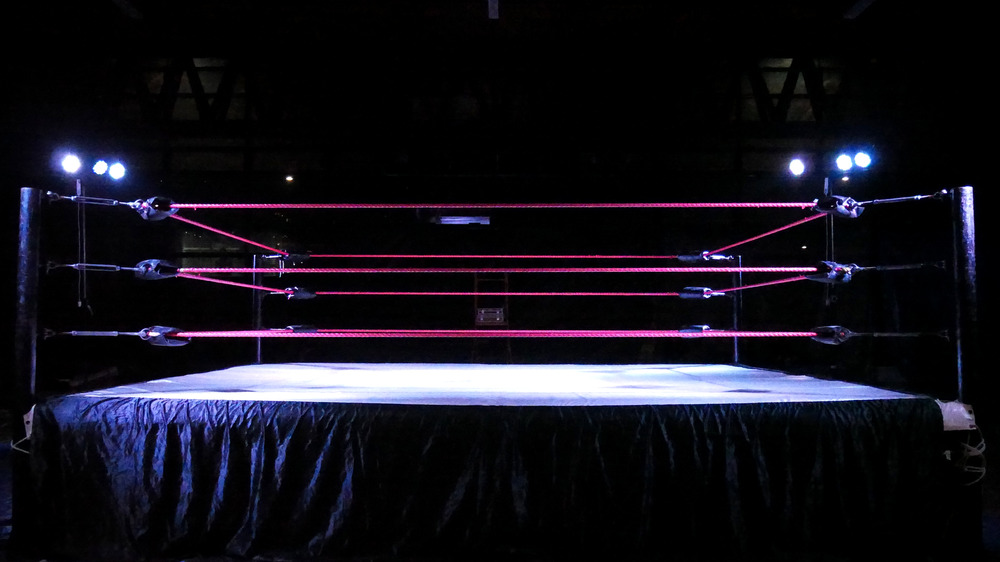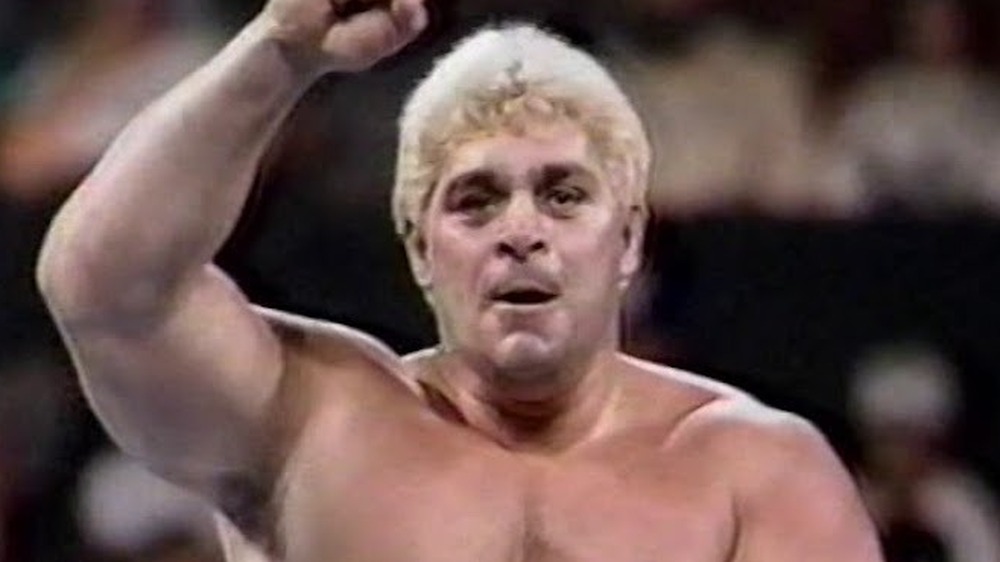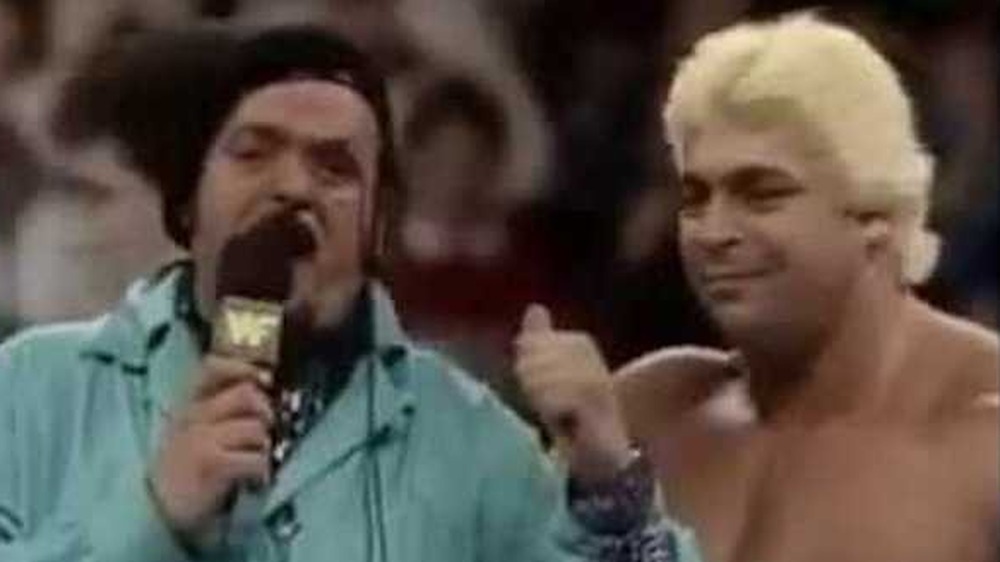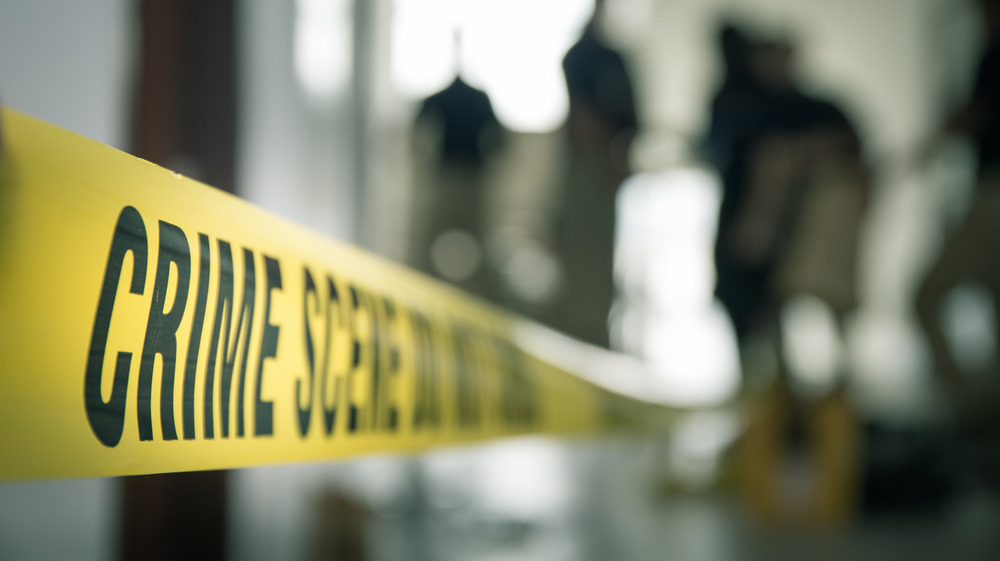This Wrestler's Life Came Straight Out Of A Mobster Film
From old-school legends such as Bret and Owen Hart to present-day performers like Chris Jericho and Kevin Owens, Canada has produced many familiar names in the wrestling business. However, newer fans might not be too familiar with Montreal native Dino Bravo, who was one of WWE's (then known as WWF) top mid-card heels over multiple stints, with the most notable lasting from 1986 to 1992. Although he never won a major singles championship during his time working for Vince McMahon, Bravo was an intimidating presence in the ring, a burly strongman who feuded with the likes of "Hacksaw" Jim Duggan and The Ultimate Warrior during his six-year stint with the company, as noted by Sportscasting.
Just one year after his 1992 retirement, Bravo was dead at the age of 44, having been shot at his home while watching television. His death brought attention to the alleged double life he lived behind the scenes, and more than two and a half decades later, it was featured on a season 2 episode of Vice TV's documentary series Dark Side of the Ring. Let's take a closer look at Dino Bravo's secret life away from the squared circle, and why one could say it could have been depicted on any given mobster film.
Dino Bravo was related by marriage to a mob godfather
Born Adolfo Bresciano, Dino Bravo was a grizzled veteran of the wrestling business when he returned to WWE in 1986 and got a decent push as the "Canadian Strongman," a villainous character who was initially part of a faction with Brutus Beefcake, Greg Valentine, and manager Johnny Valiant, as recalled by Sportscasting. He also had some success in singles competition in the years that immediately followed. By the early '90s, however, his career was on the decline, and he wasn't sure of his future beyond the squared circle. That's where his apparent mob connections came in — one of his wife's relatives was a Montreal crime boss named Vincenzo Cotroni.
As quoted by Pro Wrestling Stories, fellow Canadian WWE legend Rick Martel revealed in an interview that Bravo didn't want to retire but had no choice because company officials no longer had any plans for him.
"Dino liked the high lifestyle — he had a sports Mercedes, he had a big home, you know — and suddenly wrestling was over," Martel said. "Dino couldn't be a 9 to 5 guy; he didn't have any business experience of any kind. Wrestling was his whole life. And back then, WWF was the only game in town. So if he couldn't do it for the WWF, what could he do? His uncle [by marriage] was the head of the mafia in Montreal. And he was always saying, 'Dino, come work for me.'"
Bravo was reluctant to enter organized crime
As further recalled by Rick Martel, Dino Bravo was aware that he had the opportunity to "make really good money" — albeit illegally — by working for his uncle. While the aging grappler was reluctant to work full-time for the Cotroni crime family, he apparently gave in when he was forced to swallow his pride and borrow money from his mother.
"Dino was the kind of guy who always wanted more and more. He knew himself, and he knew his demons. But then his debts and lifestyle got too much," Martel explained, per Pro Wrestling Stories.
With his options limited, Bravo reportedly entered the cigarette trafficking business, where, as detailed in his Dark Side of the Ring episode (via TSN), his size and strength was put to use as an enforcer and debt collector. As Martel noted, the ex-wrestler worked closely with cigarette smugglers from Canadian Indigenous groups who were "big wrestling fans." These figures were purportedly so excited to be working with someone of Bravo's stature that they didn't do business with anyone else.
Thanks to his supposed "monopoly" with the Indigenous smugglers, Bravo caught the attention of Montreal's top cocaine dealers, who wanted him to help them make money, too. This turn of events, however, was the apparent catalyst for the former WWE Superstar's untimely — and violent — death.
Dino Bravo's murder remains unsolved to this day
As further quoted by Pro Wrestling Stories, Rick Martel recalled that Dino Bravo had "some kind of agreement" with Montreal's cocaine dealers, which involved him storing a $400,000 shipment of the drug in a warehouse for three days. Things went awry, however, when the person assigned to pick up the shipment got busted by police officers at the warehouse. This resulted in the dealers blaming Bravo for the cops showing up at the warehouse and the former wrestler insisting the deal wouldn't have gone wrong if his associates immediately picked up the cocaine.
About one week later, on March 17, 1993, Bravo stayed home to watch a hockey game on TV while his wife took his daughter to ballet class. That night, they returned to find him lying dead in his own blood, having been shot a total of 17 times. Reportedly, there were no signs of forced entry at his home.
"They had somebody; an inside person," Martel theorized. "It was probably someone who was watching hockey with him and said, 'Hey look, Dino, I'm gonna go to the bathroom... They shot him from behind."
In his recap of Bravo's Dark Side of the Ring episode, wrestling blogger Scott Keith cited a newspaper reporter who told Vice that the indigenous smugglers Bravo had worked with might have put a hit out on him with the help of some biker gang members.
The theories may vary, but 28 years later, Bravo's murder still remains unsolved.



